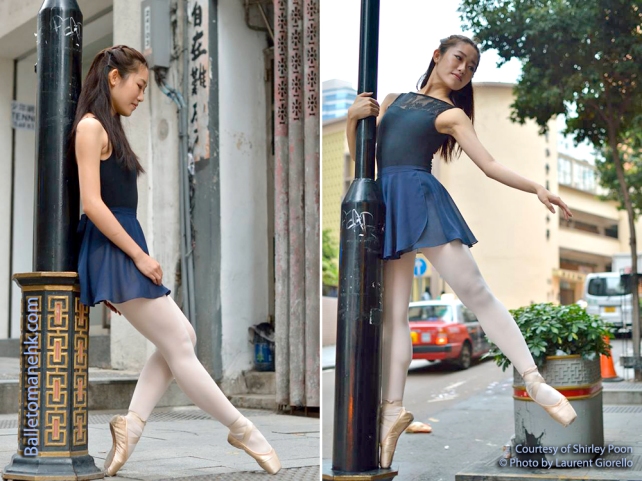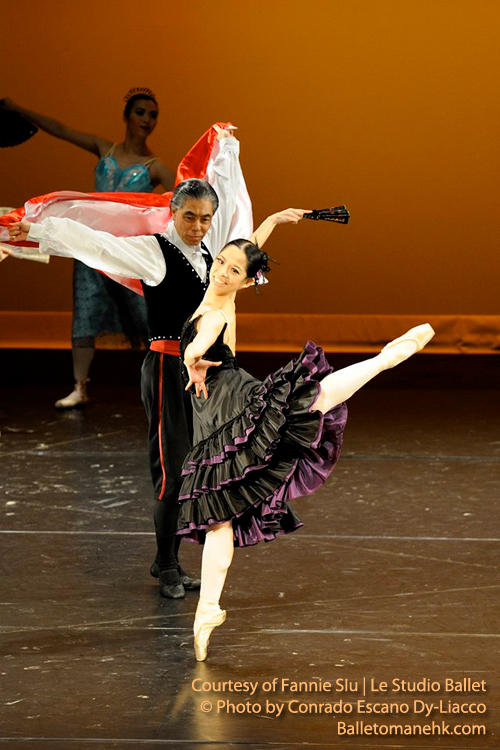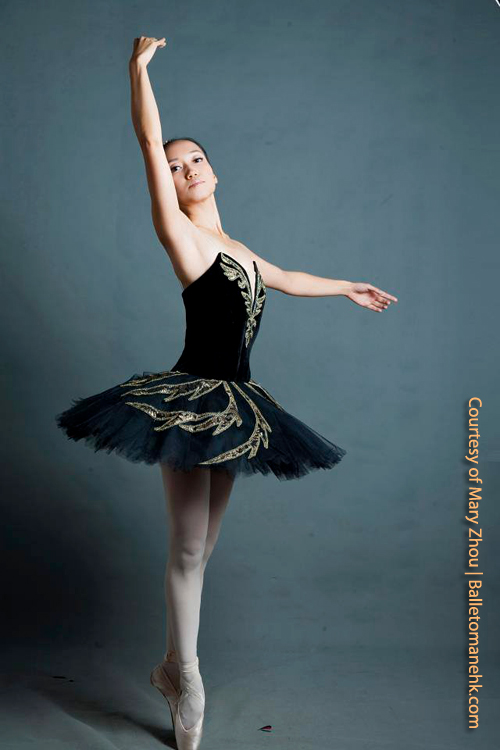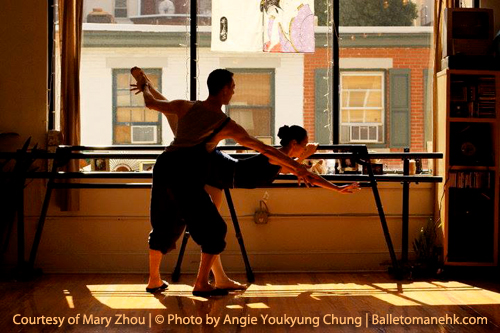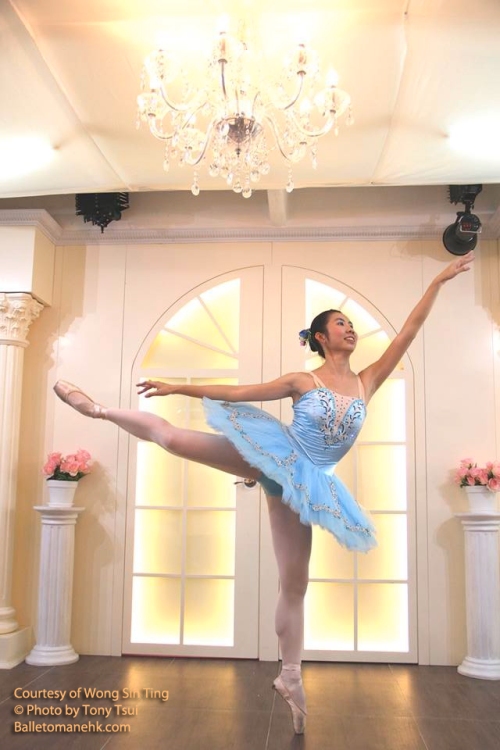This is the fifth in the series of Conversations with Adult Ballet Students. Leave me a message if you would like to be profiled in a future edition.
這是《與成人芭蕾舞學生的對話》系列的第五章。如果你有興趣與我的讀者分享你的心聲和經歷,請給我留言。
Meet Angel Chau, who works with equity sales in a brokerage house in Hong Kong and finds her dream in the ballet studio, which she dubs her “wonderland.”
這次爲大家介绍的成人芭蕾舞學生是周文英,她在香港一家証卷行從市股票銷售的工作,工餘時常在她稱爲“樂園”的芭蕾舞室裏尋夢。
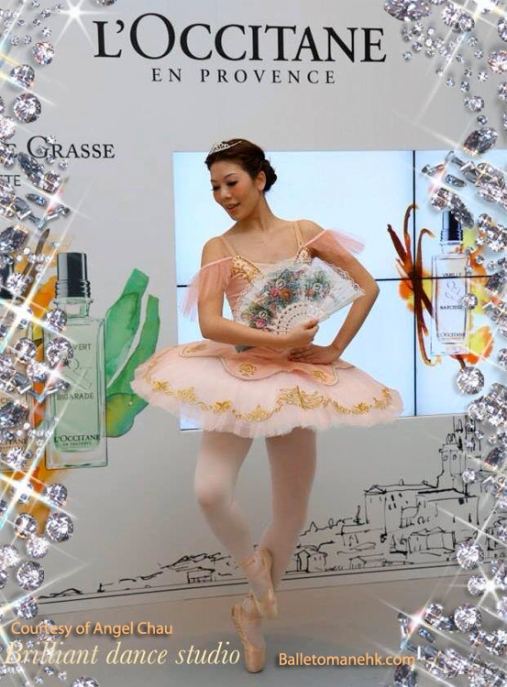
Q: Did you ever take ballet lessons as a kid? When was that?
A: I took my first ballet class when I was around 4 or 5. I was so young that I don’t remember the details. All I can remember is that the music my teacher used for our dance came from the movie “An American Tail”—the title song of which is “Somewhere Out There.” When I was in junior high school, I joined a dance troupe called Crystal Western Folk Dance. Before we rehearsed our dances, we were given some basic ballet training. It was informal though. At that time, Winghong Wa became my first ballet teacher. He was in the first graduating class of the first ballet school in China. When I started my lessons with him, he was already over 50. In him, I see someone who is truly passionate about ballet, and this passion is not limited by age.
問:你小時曾經學過芭蕾舞嗎?是幾歲的時候?
答:四、五歲時學過。年紀太小甚麼也不記得,只記得當年課堂上老師排舞音樂是老鼠也移民的主題曲–Somewhere out there。後來是初中時加入旭穎西方舞團,排舞前會上一些芭蕾舞基訓,不過也不是正式的芭蕾舞課。當年的芭蕾舞啟蒙老師-華永康老師是中國第一間芭蕾舞蹈學校的第一批學生,他教我跳舞時也年過半百了。從他身上我看到一個真正熱愛芭蕾的人,絕對不受年紀性別限制。
Q: When did you start taking ballet class as an adult?
A: After university and having worked for two years, I suddenly realized that life was dry and boring—going to work day in and day out with the sole purpose of making money. So I decided to give myself the gift of dance as the birthday present for that year.
問:你成年後何時開始學芭蕾?
答:大學畢業,出來工作兩年後,突然有一天想,每天這樣上班下班,每天錢錢錢錢,人生很枯燥。下定決心,學跳舞作為自己當年的生日禮物。
Q: What motivated you to study ballet?
A: I have always loved to dance since I was a little child. But I always have felt that ballet is the foundation of all dance styles. That’s why I chose the ballet studio to be my escape from the world of money—it’s my “wonderland.”
問:學芭蕾的動機是甚麽?
答:因為從少到大也喜歡跳舞,而我一直覺得芭蕾舞是各種舞蹈的基礎,所以當年就選定了芭蕾舞室作為我暫時逃避金錢世界的wonderland.
Q: What do you find to be the biggest challenge or difficulty?
A: Time. When it comes to good ballet technique and stamina, there is no shortcut. The muscle tone, each tiny movement of the hands and the feet, the grace—all of these must be built through continuous training, hour after hour, day after day.
Adults are often constrained by their work schedule. Sometimes they have to socialize for work purposes during afterhours or travel on business, so they can’t make it to class. Besides work, some of us need to spend time with our significant others or our family. Some classmates may have been going very strong in class until they get pregnant and need to spend a tremendous amount of time to take care of their children. They can’t afford the time to take class anymore.
問:對你來講,成人芭蕾舞學生最大的挑戰是甚麽?
答:時間。芭蕾舞的訓練是沒有捷徑的,你的體能是你一天連續上幾小時慢慢練出來的,你的技巧是一周上多少堂課,一個一個肌肉練出來的,你的舉手頭足,氣質,是日積月累浸出來的。
成年人工作繁忙,下班可能要應酬來不了上課,又或出差了上不了課,除了工作,還有其他角色,你的另一半你的家人需要你給他時間。有些同學,可能一直跳得很好,後來懷孕了,孩子出生後需要給孩子大量的時間,更沒時間上課。
Q: What does ballet bring to your life?
A: I have learned the importance of perseverance. I’m a typical Hong Konger, which means I want efficiency and cost effectiveness in everything. But when it comes to ballet, there are no short courses. To be able to dance well, you’ve got to put in a long period of training time. If you persevere, you will find yourself having improved after a few years.
Another thing I got from ballet is friendship. I have made friends who are younger than me, who share the same interest as me. We have gone through exams and stage performances together. All these years, my classmates are not only friends but my teachers as well.
問:芭蕾爲你的人生帶來了些甚麽?
答:堅持—我是很典型的香港人,事事講求效率,快靚正,但芭蕾舞是沒有這樣的雞精課程的。要跳得好是要花上一段長時間的訓練,只有堅持,日復一日的練,幾年後你才會發現自己有進步。
友情—一堆比我年青的女生,一堆有共同興趣的朋友,一堆一起考試的戰友,一堆一起在舞台上發光發亮的追夢者,一堆這些年來教過我的良師益友。
Q: What is the greatest achievement in your ballet life so far?
A: Although I have performed countless times, I know that I still don’t dance very well, so I can’t really say I have any achievements. But, I’d get very emotional every time I have finished a performance after having worked hard with my teacher and classmates.
Last year, I took two coworkers who were absolute beginners to take class with me. Gradually, they started to fall under the spell of ballet’s magic. Having successfully promoted ballet is an achievement that I am very happy about.
問:直至目前爲止,你的芭蕾生涯中最大的成就是甚麽?
答:雖然跳過無數大大小小的表演,不過自知自己跳得不是很好,實在無法認為是成就。
不過,當老師同學一起努力幾過月,最後完成表演後,每一次也很感動。
還有,去年,無意中帶了兩個從未學習芭蕾舞的同事去上課,然後她們慢慢迷上芭蕾,成功把芭蕾推廣也是叫我很開心的成就。
Q: What have you gained that was out of your expectation?
A: Ha ha ha, well, I don’t have to spend money on pedicure. In the summer, I would still wear sandals. If someone criticize on the look of my toe nails, I’d explain that this is what lies behind the beauty of ballet.
問:有没有甚麽意想不到的收獲?
答:哈哈哈!夏天不用花錢去做水晶腳甲。夏天,我仍會穿涼鞋的,如果有人批評我的腳甲不美,我會說這是芭蕾舞者美麗背後的辛酸。
Q: What have you lost?
A: What I have gained is far greater than what I have lost.
問:有没有失去或犧牲了甚麽?
答:獲得的遠遠比失去的多。
Q: Is it all worth it?
A: Sure is!
問:一切都值得嗎?
答:值得!!!!!
Q: What is your goal in ballet?
A: To stay healthy and dance until I die.
問:談談你的芭蕾夢想或目標好嗎?
答:身體健康,能够跳一世芭蕾舞。
Q: You also have continued to perform folk dance as an adult. Having studied both folk dance and ballet, what similarities do you find between the two dance forms?
A: There are quite a lot of similarities. Take Italian folk dance as an example. A lot of its allegro steps are based on ballet.
問:我知道你從小以來都一直有表演民族舞。可否講下民族舞和芭蕾舞之間有甚麽相似之處?
答:兩者是有不少相同之處的,例如意大利的民族舞,它的快板舞步有很多都是基於芭蕾舞的快板舞步的。
Q: How has folk dance enriched your life?
A: I have traveled with my dance troupe to Inner Mongolia for an international folk dance festival, where I met many different dance groups from different countries. Later on when dance festivals are hosted in those different countries, our troupe will be invited to attend too. Two years ago, I also participated in a folk dance festival in Slovakia and made many friends.
問:民族舞爲你帶來了甚麽驚喜嗎?
答:我曾經跟我的舞團一起到内蒙参加國際民族舞節,與世界各地的民族舞團互相交流,日後,那些國家也會邀請我們到他們那裏表演呢。兩年前,我也到過斯洛伐克共和國参加他們的民族舞節,並且交了不少朋友。



